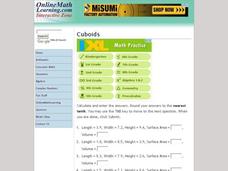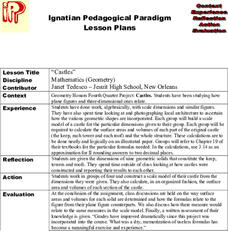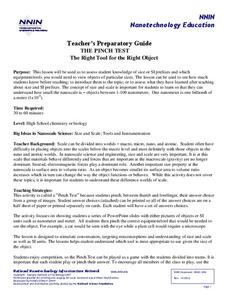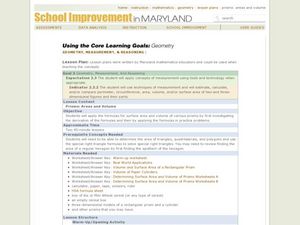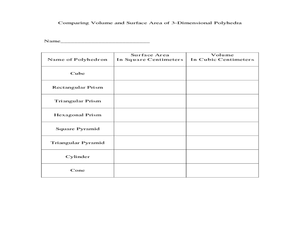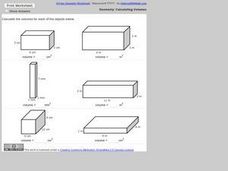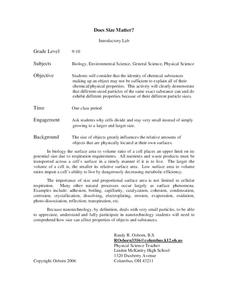Curated OER
Chapter 6: Geometry Perimeter and Area
In this perimeter and area instructional activity, students find the perimeter of various polygons. They compute the perimeter, surface area, circumference, and volume of given figures. Students explore trigonometric ratios. This...
Curated OER
Exploring Similarity Using Scale Drawings
Learners explore scale factor as they create a scale drawing of a box, then determine the surface area and volume of the original and the scale drawing. The one page worksheet contains activities and procedures with four questions.
Curated OER
A Cone and Its Net
Create and investigate nets for solid shapes with your class. They identify the different parts and faces of each polygon and solid then calculate the surface area and volume of cones. They use circle sectors of varying sizes to build...
Curated OER
Dilations of 2 and 3 dimentional figures and their effect on area, surface area, and volume.
Seventh graders investigate the area and volume of 2D and 3D figures. In this geometry lesson, 7th graders create a storyboard explaining their knowledge of 2D and 3D shapes. They analyze their data and interpret their results.
Curated OER
Cuboids
In this geometry worksheet, 10th graders calculate the surface area and volume of a cube. The one page interactive worksheet contains ten questions. Answers and hints are included.
Curated OER
Castles
Students create a scale model to a castle using the dimensions they were given. They calculate the surface areas and volumes of each section of their castle.
Curated OER
Cylinders and Scale
Students review what a cylinder is and how a cylinder is measured. They build a variety of cylinders with different heights and radii. They compare the surface area and volume of each cylinder and discuss anything that surprises them...
Curated OER
New Boxes From Old
Students find the volume and surface area of a rectangular box (e.g., a cereal box), and then figure out how to convert that box into a new, cubical box having the same volume as the original. As they construct the new, cube-shaped box...
Curated OER
TE Activity: The Boxes Go Mobile
Students create a mobile of boxes and cubes that they made in a previous lesson that can be accessed from this page. They design the mobile using method that an engineer would use to balance the items based on surface areas and volumes.
Cornell University
Scaling Down: Effects of Size on Behavior
Two activities explore the concept of size, especially small sizes down to the nano. Scholars practice determining volume, mass, and density and calculate exponential increases and decreases. They then predict and test the effect of size...
Noyce Foundation
Parallelogram
Parallelograms are pairs of triangles all the way around. Pupils measure to determine the area and perimeter of a parallelogram. They then find the area of the tirangles formed by drawing a diagonal of the parallelogram and compare their...
National Nanotechnology Infrastructure Network
The Pinch Test
Test your pupils' understanding of the scale from macro to atomic. While displaying images of different materials, learners identify what they would need to make that material visible. Their choices range from the human eye to an...
Teach Engineering
Scale Model Project
Try your hand at scale models. Scholars create a scale model of an object using a scale factor of their choice. As part of the project, they give presentations on their processes and calculations. This is the last installment of the...
Exploratorium
Viral Packaging
Create a protective protein shell as a package. Using the included template, pupils tape together 20 triangles to create a 20-sided shape to represent the protective shell of a virus. The model of the protein shell incases the nucleic...
Noyce Foundation
Piece it Together
Score some problems all related to soccer balls. The first few problems focus on pattern blocks to see relationships between figures. More advanced problems focus on actual soccer balls, the patterns on the balls, and their volumes and...
Curated OER
Squares and Cubes
Middle schoolers recognize, analyze, and use square color tiles and interlocking cubes to discover patterns in perimeter, area, and volume. They will then chart and graph their results.
Curated OER
Perimeter and Area of Similar Figures
Students explore the relationships between similar figures. In this relationships between similar figures lesson, students discuss relationships between perimeter, circumference, area, surface area, and volume of similar figures through...
Curated OER
Artistic Angles
Fifth graders explore angles by using protractors. They recognize, describe and determine the surface area and volume of three-dimensional shapes. Students recognize the right angle, acute angle, obtuse angle and vertex. They identify...
Curated OER
Geometry, Measurement & Reasoning
Students measure prisms and determine their volume. In this measurement and reasoning lesson, students estimate the volume and area of prisms. They measure given boxes. Students use paper to create prisms and cylinders. They determine...
Curated OER
The Value of Volume
Students measure the perimeter and area of their polygons. In this geometry instructional activity, students calculate the volume and area using the correct tools. They calculate the time and temperature and the perimeter and side...
Curated OER
Calculating Volumes
In this geometry worksheet, learners, calculate the volume given the sides of the shapes. There are 6 questions dealing with volumes.
Curated OER
Volume of Spheres
Students find the volume of spheres. In this geometry lesson, students measure and derive the formula for each shape and solid. They use the correct terminology and units when solving these problems.
NOAA
What Little Herc Saw
See the underwater world through a different pair of eyes! Middle school marine biologists identify deep-sea organisms by examining images taken by an ROV from the Okeanos Explorer. After determining what creatures lie beneath the...
Curated OER
Does Size Matter?
Students explore the surface area to volume ratio in cellular respiration. While participating in an interactive lab experiment, they examine proportional surface area and discuss nanotechnology. Students observe the effectiveness of...






